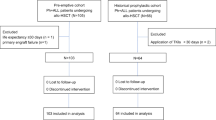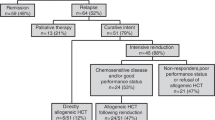Abstract
Minimal residual disease (MRD) after allogeneic stem cell transplantation (SCT) for Ph+ acute lymphoblastic leukemia (ALL) is predictive of relapse. Imatinib administration subsequent to SCT may prevent relapse, but the role of scheduling and its impact on outcome are not known. In a prospective, randomized multicenter trial, we compared the tolerability and efficacy of post-transplant imatinib administered either prophylactically (arm A; n=26) or following detection of MRD (arm B; n=29). Prophylactic imatinib significantly reduced the incidence of molecular recurrence after SCT compared with MRD-triggered imatinib (40% vs 69%; P=0.046). Median duration of PCR negativity was 26.5 and 6.8 months, respectively (P=0.065). Five-year survival in both interventional groups was high (80 and 74.5%), despite premature discontinuation of imatinib in the majority of patients because of poor tolerability. Relapse probability was significantly higher in patients who became MRD positive (P=0.017). In conclusion, post-transplant imatinib results in a low relapse rate, durable remissions and excellent long-term outcome in patients with BCR–ABL1-positive ALL irrespective of whether it is given prophylactically or MRD-triggered. Reappearance of BCR–ABL1 transcripts early after SCT or at higher levels identifies a small subset of patients who do not benefit sufficiently from imatinib, and in whom alternative approaches should be explored.
This is a preview of subscription content, access via your institution
Access options
Subscribe to this journal
Receive 12 print issues and online access
$259.00 per year
only $21.58 per issue
Buy this article
- Purchase on Springer Link
- Instant access to full article PDF
Prices may be subject to local taxes which are calculated during checkout



Similar content being viewed by others
References
de Labarthe A, Rousselot P, Huguet-Rigal F, Delabesse E, Witz F, Maury S et al. Imatinib combined with induction or consolidation chemotherapy in patients with de novo Philadelphia chromosome-positive acute lymphoblastic leukemia: results of the GRAAPH-2003 study. Blood 2007; 109: 1408–1413.
Lee KH, Lee JH, Choi SJ, Lee JH, Seol M, Lee YS et al. Clinical effect of imatinib added to intensive combination chemotherapy for newly diagnosed Philadelphia chromosome-positive acute lymphoblastic leukemia. Leukemia 2005; 19: 1509–1516.
Lee S, Kim YJ, Min CK, Kim HJ, Eom KS, Kim DW et al. The effect of first-line imatinib interim therapy on the outcome of allogeneic stem cell transplantation in adults with newly diagnosed Philadelphia chromosome-positive acute lymphoblastic leukemia. Blood 2005; 105: 3449–3457.
Rea D, Legros L, Raffoux E, Thomas X, Turlure P, Maury S et al. High-dose imatinib mesylate combined with vincristine and dexamethasone (DIV regimen) as induction therapy in patients with resistant Philadelphia-positive acute lymphoblastic leukemia and lymphoid blast crisis of chronic myeloid leukemia. Leukemia 2006; 20: 400–403.
Wassmann B, Pfeifer H, Goekbuget N, Beelen DW, Beck J, Stelljes M et al. Alternating versus concurrent schedules of imatinib and chemotherapy as front-line therapy for Philadelphia-positive acute lymphoblastic leukemia (Ph+ ALL). Blood 2006; 108: 1469–1477.
Yanada M, Takeuchi J, Sugiura I, Akiyama H, Usui N, Yagasaki F et al. High complete remission rate and promising outcome by combination of imatinib and chemotherapy for newly diagnosed BCR-ABL-positive acute lymphoblastic leukemia: a phase II study by the Japan Adult Leukemia Study Group. J Clin Oncol 2006; 24: 460–466.
Ravandi F, O'Brien S, Thomas D, Faderl S, Jones D, Garris R et al. First report of phase II study of dasatinib with hyperCVAD for the frontline treatment of patients with Philadelphia chromosome positive (Ph+) acute lymphoblastic leukemia. Blood 2010; 116: 2070–2077.
Delannoy A, Delabesse E, Lheritier V, Castaigne S, Rigal-Huguet F, Raffoux E et al. Imatinib and methylprednisolone alternated with chemotherapy improve the outcome of elderly patients with Philadelphia-positive acute lymphoblastic leukemia: results of the GRAALL AFR09 study. Leukemia 2006; 20: 1526–1532.
Ottmann OG, Pfeifer H . First-line treatment of Philadelphia chromosome-positive acute lymphoblastic leukaemia in adults. Curr Opin Oncol 2009; 21 (Suppl 1): S43–S46.
Ottmann OG, Pfeifer H . Management of Philadelphia chromosome-positive acute lymphoblastic leukemia (Ph+ ALL). Hematology Am Soc Hematol Educ Program 2009, 371–381.
Fielding AK, Rowe JM, Richards SM, Buck G, Moorman AV, Durrant IJ et al. Prospective outcome data on 267 unselected adult patients with Philadelphia chromosome-positive acute lymphoblastic leukemia confirms superiority of allogeneic transplantation over chemotherapy in the pre-imatinib era: results from the International ALL Trial MRC UKALLXII/ECOG2993. Blood 2009; 113: 4489–4496.
Bassan R, Rossi G, Pogliani EM, Di BE, Angelucci E, Cavattoni I et al. Chemotherapy-phased imatinib pulses improve long-term outcome of adult patients with Philadelphia chromosome-positive acute lymphoblastic leukemia: Northern Italy Leukemia Group protocol 09/00. J Clin Oncol 2010; 28: 3644–3652.
Ribera JM, Oriol A, Gonzalez M, Vidriales B, Brunet S, Esteve J et al. Concurrent intensive chemotherapy and imatinib before and after stem cell transplantation in newly diagnosed Philadelphia chromosome-positive acute lymphoblastic leukemia. Final results of the CSTIBES02 trial. Haematologica 2010; 95: 87–95.
Esperou H, Boiron JM, Cayuela JM, Blanchet O, Kuentz M, Jouet JP et al. A potential graft-versus-leukemia effect after allogeneic hematopoietic stem cell transplantation for patients with Philadelphia chromosome-positive acute lymphoblastic leukemia: results from the French Bone Marrow Transplantation Society. Bone Marrow Transplant 2003; 31: 909–918.
Lee S, Kim DW, Cho B, Kim YJ, Kim YL, Hwang JY et al. Risk factors for adults with Philadelphia-chromosome-positive acute lymphoblastic leukaemia in remission treated with allogeneic bone marrow transplantation: the potential of real-time quantitative reverse-transcription polymerase chain reaction. Br J Haematol 2003; 120: 145–153.
Laport GG, Alvarnas JC, Palmer JM, Snyder DS, Slovak ML, Cherry AM et al. Long-term remission of Philadelphia chromosome-positive acute lymphoblastic leukemia after allogeneic hematopoietic cell transplantation from matched sibling donors: a 20-year experience with the fractionated total body irradiation-etoposide regimen. Blood 2008; 112: 903–909.
Yanada M, Naoe T, Iida H, Sakamaki H, Sakura T, Kanamori H et al. Myeloablative allogeneic hematopoietic stem cell transplantation for Philadelphia chromosome-positive acute lymphoblastic leukemia in adults: significant roles of total body irradiation and chronic graft-versus-host disease. Bone Marrow Transplant 2005; 36: 867–872.
Wassmann B, Pfeifer H, Stadler M, Bornhauser M, Bug G, Scheuring UJ et al. Early molecular response to posttransplantation imatinib determines outcome in MRD+ Philadelphia-positive acute lymphoblastic leukemia (Ph+ ALL). Blood 2005; 106: 458–463.
Kantarjian H, Giles F, Wunderle L, Bhalla K, O'Brien S, Wassmann B et al. Nilotinib in imatinib-resistant CML and Philadelphia chromosome-positive ALL. N Engl J Med 2006; 354: 2542–2551.
Ottmann O, Dombret H, Martinelli G, Simonsson B, Guilhot F, Larson RA et al. Dasatinib induces rapid hematologic and cytogenetic responses in adult patients with Philadelphia chromosome positive acute lymphoblastic leukemia with resistance or intolerance to imatinib: interim results of a phase 2 study. Blood 2007; 110: 2309–2315.
Radich J, Gehly G, Lee A, Avery R, Bryant E, Edmands S et al. Detection of bcr-abl transcripts in Philadelphia chromosome-positive acute lymphoblastic leukemia after marrow transplantation. Blood 1997; 89: 2602–2609.
Blair A, Goulden NJ, Libri NA, Oakhill A, Pamphilon DH . Immunotherapeutic strategies in acute lymphoblastic leukaemia relapsing after stem cell transplantation. Blood Rev 2005; 19: 289–300.
Peggs KS, Mackinnon S . Cellular therapy: donor lymphocyte infusion. Curr Opin Hematol 2001; 8: 349–354.
Nakasone H, Kanda Y, Takasaki H, Nakaseko C, Sakura T, Fujisawa S et al. Prophylactic impact of imatinib administration after allogeneic stem cell transplantation on the incidence and severity of chronic graft versus host disease in patients with Philadelphia chromosome-positive leukemia. Leukemia 2010; 24: 1236–1239.
Imahashi N, Tokunaga M, Nishiwaki S, Yanagisawa M, Ozawa Y, Miyamura K . Successful treatment with imatinib-combined chemotherapy for relapsed Philadelphia-positive acute lymphoblastic leukemia after allogeneic bone marrow transplantation. Rinsho Ketsueki 2009; 50: 1612–1615.
Yoshimitsu M, Fujiwara H, Ozaki A, Hamada H, Matsushita K, Arima N et al. Case of a patient with Philadelphia-chromosome-positive acute lymphoblastic leukemia relapsed after myeloablative allogeneic hematopoietic stem cell transplantation treated successfully with imatinib and sequential donor lymphocyte infusions. Int J Hematol 2008; 88: 331–335.
Carpenter PA, Snyder DS, Flowers ME, Sanders JE, Gooley TA, Martin PJ et al. Prophylactic administration of imatinib after hematopoietic cell transplantation for high-risk Philadelphia chromosome-positive leukemia. Blood 2007; 109: 2791–2793.
Pfeifer H, Wassmann B, Pavlova A, Wunderle L, Oldenburg J, Binckebanck A et al. Kinase domain mutations of BCR-ABL frequently precede imatinib-based therapy and give rise to relapse in patients with de novo Philadelphia-positive acute lymphoblastic leukemia (Ph+ ALL). Blood 2007; 110: 727–734.
Ottmann OG, Wassmann B, Pfeifer H, Giagounidis A, Stelljes M, Duhrsen U et al. Imatinib compared with chemotherapy as front-line treatment of elderly patients with Philadelphia chromosome-positive acute lymphoblastic leukemia (Ph+ALL). Cancer 2007; 109: 2068–2076.
Scheuring UJ, Pfeifer H, Wassmann B, Bruck P, Atta J, Petershofen EK et al. Early minimal residual disease (MRD) analysis during treatment of Philadelphia chromosome/Bcr-Abl-positive acute lymphoblastic leukemia with the Abl-tyrosine kinase inhibitor imatinib (STI571). Blood 2003; 101: 85–90.
Nishiwaki S, Miyamura K, Kato C, Terakura S, Ohashi K, Sakamaki H et al. Impact of post-transplant imatinib administration on Philadelphia chromosome-positive acute lymphoblastic leukaemia. Anticancer Res 2010; 30: 2415–2418.
Chen H, Liu KY, Xu LP, Liu DH, Chen YH, Zhao XY et al. Administration of imatinib after allogeneic hematopoietic stem cell transplantation may improve disease-free survival for patients with Philadelphia chromosome-positive acute lymphobla stic leukemia. J Hematol Oncol 2012; 5: 29.
Savani BN, Srinivasan R, Espinoza-Delgado I, Dorrance C, Takahashi Y, Igarashi T et al. Treatment of relapsed blast-phase Philadelphia-chromosome-positive leukaemia after non-myeloablative stem-cell transplantation with donor lymphocytes and imatinib. Lancet Oncol 2005; 6: 809–812.
Tiribelli M, Sperotto A, Candoni A, Simeone E, Buttignol S, Fanin R . Nilotinib and donor lymphocyte infusion in the treatment of Philadelphia-positive acute lymphoblastic leukemia (Ph+ ALL) relapsing after allogeneic stem cell transplantation and resistant to imatinib. Leuk Res 2009; 33: 174–177.
Acknowledgements
We are also indebted to Christine Wabbels and Ann-Katrin Hoeck for data management and to Doreen Badowski, Brigitte Gehrke, Tamara Klan, Gabriele Lippok, Luisa Göller, Sandra Markovic, Anne Zentgraf for their excellent technical assistance. This work was supported by the Deutsche Jose-Carreras Leukämiestiftung (project R06/25), the Adolf-Messer Foundation and by a grant from Novartis. OGO hold an endowed professorship of the Deutsche Jose Carreras Leukämie Stiftung.
Author contributions
HP, BW, DH and OGO conceived and designed the study; HP, BW, WB, JD, MB, M Stadler., DB, VV, TB, M Stelljes, CF, PD, AK, KS-E, RS, EL, BK, HAH, MG, PB, HS, NG, DH and OGO provided study materials or patients; HP, BW, DH and OGO analyzed data; HP and OGO wrote the manuscript; and all authors gave final approval of the manuscript.
Author information
Authors and Affiliations
Consortia
Corresponding author
Ethics declarations
Competing interests
OGO received honoraria for participation in advisory boards and as speaker at scientific meetings from Novartis. HP received travel support from Novartis. The remaining authors declare no conflict of interest.
Additional information
Supplementary Information accompanies this paper on the Leukemia website
Rights and permissions
About this article
Cite this article
Pfeifer, H., Wassmann, B., Bethge, W. et al. Randomized comparison of prophylactic and minimal residual disease-triggered imatinib after allogeneic stem cell transplantation for BCR–ABL1-positive acute lymphoblastic leukemia. Leukemia 27, 1254–1262 (2013). https://doi.org/10.1038/leu.2012.352
Received:
Revised:
Accepted:
Published:
Issue Date:
DOI: https://doi.org/10.1038/leu.2012.352
Keywords
This article is cited by
-
Reduced-intensity allogenic transplantation for children and adolescents with Philadelphia chromosome-positive acute lymphoblastic leukemia
Annals of Hematology (2024)
-
Management of children and adolescents with chronic myeloid leukemia in blast phase: International pediatric CML expert panel recommendations
Leukemia (2023)
-
Thiotepa, busulfan and fludarabine conditioning-regimen is a promising approach for older adult patients with acute lymphoblastic leukemia treated with allogeneic stem cell transplantation
Bone Marrow Transplantation (2023)
-
Prophylactic or preemptive tyrosine kinase inhibitor therapy after allogeneic hematopoietic cell transplantation for Philadelphia chromosome-positive acute lymphoblastic leukemia
International Journal of Hematology (2023)
-
Autologous versus allogeneic hematopoietic cell transplantation for older patients with acute lymphoblastic leukemia. An analysis from the Acute Leukemia Working Party of the European Society for Blood and Marrow Transplantation
Bone Marrow Transplantation (2023)



